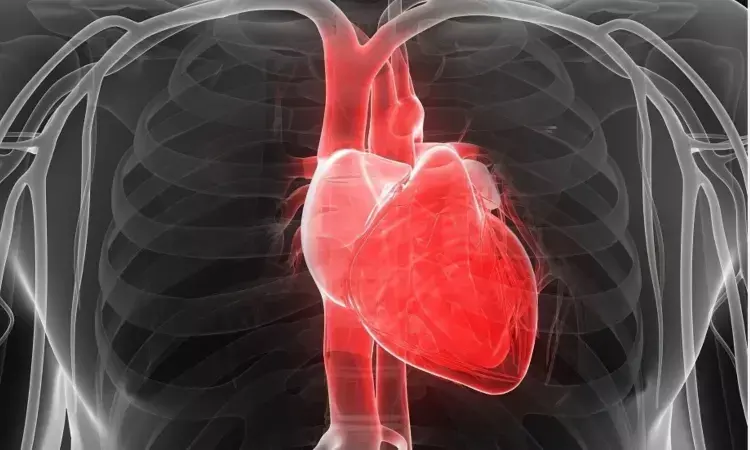- Home
- Medical news & Guidelines
- Anesthesiology
- Cardiology and CTVS
- Critical Care
- Dentistry
- Dermatology
- Diabetes and Endocrinology
- ENT
- Gastroenterology
- Medicine
- Nephrology
- Neurology
- Obstretics-Gynaecology
- Oncology
- Ophthalmology
- Orthopaedics
- Pediatrics-Neonatology
- Psychiatry
- Pulmonology
- Radiology
- Surgery
- Urology
- Laboratory Medicine
- Diet
- Nursing
- Paramedical
- Physiotherapy
- Health news
- Fact Check
- Bone Health Fact Check
- Brain Health Fact Check
- Cancer Related Fact Check
- Child Care Fact Check
- Dental and oral health fact check
- Diabetes and metabolic health fact check
- Diet and Nutrition Fact Check
- Eye and ENT Care Fact Check
- Fitness fact check
- Gut health fact check
- Heart health fact check
- Kidney health fact check
- Medical education fact check
- Men's health fact check
- Respiratory fact check
- Skin and hair care fact check
- Vaccine and Immunization fact check
- Women's health fact check
- AYUSH
- State News
- Andaman and Nicobar Islands
- Andhra Pradesh
- Arunachal Pradesh
- Assam
- Bihar
- Chandigarh
- Chattisgarh
- Dadra and Nagar Haveli
- Daman and Diu
- Delhi
- Goa
- Gujarat
- Haryana
- Himachal Pradesh
- Jammu & Kashmir
- Jharkhand
- Karnataka
- Kerala
- Ladakh
- Lakshadweep
- Madhya Pradesh
- Maharashtra
- Manipur
- Meghalaya
- Mizoram
- Nagaland
- Odisha
- Puducherry
- Punjab
- Rajasthan
- Sikkim
- Tamil Nadu
- Telangana
- Tripura
- Uttar Pradesh
- Uttrakhand
- West Bengal
- Medical Education
- Industry
Aficamten found to improve exercise tolerance of patients with hypertrophic obstructive cardiomyopathy: JAMA

Exercise intolerance is often severe among patients with cardiovascular disease and can impose significant limitations on their physical abilities and quality of life. Medications known as cardiac myosin inhibitors (CMIs) are being developed to help patients with hypertrophic obstructive cardiomyopathy (HOCM), a disease in which the heart muscle becomes thickened leading to reduced blood flow out of the heart. In a new analysis led by researchers from Mass General Brigham, investigators probed multiple exercise response patterns before and after exposure to the CMI aficamten in the SEQUIOA-HCM trial. Results are published today in JAMA Cardiology.
“My laboratory has had a longstanding focus on understanding mechanisms of exercise intolerance and exploration of therapeutic interventions to improve exercise capacity,” said corresponding author Gregory Lewis, MD. the Section Head of Heart Failure and Director of Cardiopulmonary Exercise Testing at Massachusetts General Hospital, a founding member of the Mass General Brigham healthcare system.
The phase-3, placebo-controlled, randomized clinical trial, SEQUIOA-HCM, sponsored by Cytokinetics, Inc., evaluated effects of aficamten on exercise capacity and cardiac function. The primary endpoint of the study was change in peak oxygen uptake as measured by cardiopulmonary exercise testing under the oversight of the MGH Cardiopulmonary Exercise Testing Core Laboratory directed by Lewis.
The study found marked improvements in both peak oxygen uptake as recently reported in the New England Journal of Medicine. In addition, cardiac structure and function measures improved significantly, as adjudicated by the Echocardiography Core Laboratory directed by Scott Solomon, MD, from Brigham and Women’s Hospital, a founding member of the Mass General Brigham healthcare system.
The team assessed 263 patients who completed exercise testing at the start of the trial and 24 weeks later. They saw significant improvements in several measurements, including workload achieved, breathing efficiency and cardiac power generated during exercise, and submaximum exercise capacity measured at the anaerobic threshold. In addition, they describe a novel measurement that combined submaximum and maximum exercise capacity as an integrated way to assess exercise capacity improvement. The investigators found that changes in exercise responses related to changes in cardiac structure and function beyond just outflow obstruction.
Their findings have important clinical implications for treating HOCM and could also be relevant to broader populations of non-obstructive hypertrophic cardiomyopath.
Reference:
Lee MMY, Masri A, Nassif ME, et al. Aficamten and Cardiopulmonary Exercise Test Performance: A Substudy of the SEQUOIA-HCM Randomized Clinical Trial. JAMA Cardiol. Published online September 04, 2024. doi:10.1001/jamacardio.2024.2781
Dr Kamal Kant Kohli-MBBS, DTCD- a chest specialist with more than 30 years of practice and a flair for writing clinical articles, Dr Kamal Kant Kohli joined Medical Dialogues as a Chief Editor of Medical News. Besides writing articles, as an editor, he proofreads and verifies all the medical content published on Medical Dialogues including those coming from journals, studies,medical conferences,guidelines etc. Email: drkohli@medicaldialogues.in. Contact no. 011-43720751


